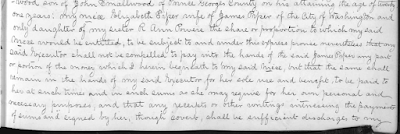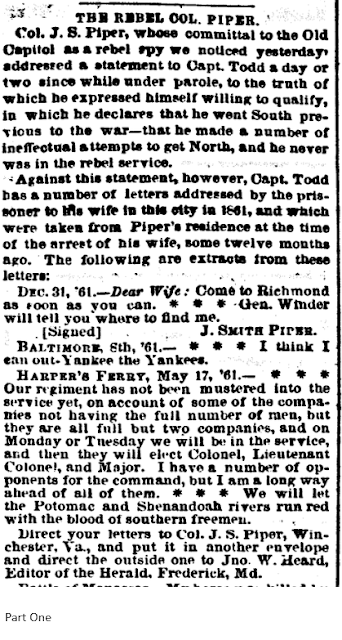© Kathy Duncan, 2025
1863 was a turbulent and eventful year for the family of James S. Piper. For that reason, it will be covered in parts.
In 1861, James S. Piper, former Captain of the Mexican War and Colonel of the Walker Expedition in Nicaragua, headed from Alabama to Maryland with the intent of joining the Confederacy there. In 1862, his wife was arrested in Washington, DC, and his letters to her were seized.
In September of 1863, Piper was arrested at his house in Washington, DC after he made his way north with the intent of rejoining his sick wife.
This first newspaper clipping places the Piper house at the corner of E and Sixth Street.
A second clipping places the Piper house at the corner of E and Seventh Street. It also notes that Piper had taken an Oath of Allegiance at Harper's Ferry in order to pass through the federal line.
None of these newspaper clippings notes that he was a former, well-known resident of Washington, DC.
The Evening Star of Washington, DC, printed excerpts from the letters that were seized during Elizabeth Piper's arrest in 1862. These excerpts revolve around Piper's activities in 1861 and do not include the family information that must have also been included in the letters. Captain Henry Baldwin Todd was named Provost Marshal to Washington, DC on 18 February 1863. He gained access to the Piper letters, and when James S. Piper was arrested in September of 1863, Todd made the letters available to the Evening Star. To date, I have not been able to locate any Provost Marshal records regarding Elizabeth's arrest or the letters themselves.
A transcription of the letters in chronological order with commentary:
"Harper's Ferry, May 17, '61--
. . .Our regiment has not been mustered into the service yet, on account of some of the companies not having the full number of men, but they are all full but two companies, and on Monday or Tuesday we will be in full service, and then they will elect Colonel, Lieutenant Colonel, and Major. I have a number of opponents for the command, but I am a long way ahead of all of them...We will let the Potomac and Shenandoah rivers run red with the blood of southern freemen.
Direct your letters to Col. J.S. Piper, Winchester, Va., and put in another envelope and direct the outside one to Jno. W. Heard, Editor of the Herald, Fredrick, Md."
On April 16, 1861, James S. Piper arrived in Baltimore, Maryland, from Montgomery, Alabama. He was intent on joining a group of Maryland volunteers for the Confederacy. One month later, he was cooling his heels at Harper's Ferry, where he had presumably already raised a company. Once they had the required number of men, officers would be elected. Piper was over-confident that he would be elected Colonel. His confidence was probably based on his previous military experience in Nicaragua. His hope that the blood of the Potomac would "run red with the blood of southern freemen" offers us a chilling insight into his view of slavery. Instructing Elizabeth to address her letters to him by the title Col. J.S. Piper offers us an insight into his view of his own stature, since at this point, the election for officers had not been held yet. He is clearly still clinging to his previous military rank. It's worth noting that the Walker Expedition was not an overtly sanctioned U.S. military operation, so the highest U.S. military rank Piper had was that of Captain. John W. Heard, the editor of the Fredrick Herald, was an open and controversial Confederate sympathizer. The federal authorities confiscated his newspaper, and it was suspended in September of 1861. Is it possible that a letter from Elizabeth to James S. Piper was found in the newspaper office, and that prompted the federals to put her under surveillance? In September 1862, John W. Heard continued his efforts to support the Confederacy by posting recruiting posters all over Frederick, Maryland, including next door to the Provost Marshal's office. Heard evidently raised a unit and joined the Confederate army. By January 1863, he had been arrested for treason and taken to Baltimore, Maryland.
This Civil War map shows the proximity from Harper's Ferry to Frederick, Maryland and to Winchester, Virginia.
"Harper's Ferry, June 5, 1861--The day of grace of Lincoln's myrmidons is nearly at an end. Their race is run, their doom is sealed, and retribution awaits them. . .Don't despond, the God of battles is on our side, and victory is nearly ours. We are impregnable at this point; all of the army of Lincoln would be nothing to attack this place. . . I would send for you and have you with me, only we are under marching orders. . . Don't despair; I can't tell you all I know, if I could it would make your heart glad. The day is not far distant when every foot of Southern soil will be free from the polluted footsteps of the Northern hordes."
This letter shows that Piper's sentiments were firmly with the Confederacy. His statement that he cannot tell her everything that he knows, but the information would make her heart glad, echoes Macbeth's words to Lady Macbeth: "Be innocent of the knowledge, dearest chuck,/Till thou applaud the deed."
"Winchester, July 14--
. . . I have received my appointment in the Confederate army, and have been assigned by the Commanding General to various duties. . . When we left Harper's Ferry I was in command of a squadron of mounted rangers. I have since been assigned to duty with a Kentucky battalion. . . I would not take the second place, that of Lieutenant Colonel in the Maryland volunteers. I am better off and better satisfied as it is."
To date, no enlistment records have been found for James S. Piper in the Confederate army. Later, when he claimed to have never enlisted or volunteered in their army, that seems to be the truth. However, he served in other ways. However, I don't know how he could have been in charge of a squadron without being enlisted. It's clear that the only reason he did not serve was that he was not elected Colonel.
"Battle of Manassas. My horse was killed by a cannonball early in the fight. I soon got a Yankee horse and was well fixed."
The First Battle of Bull Run, aka the First Battle of Manassas, was fought on July 21, 1861. It would be possible for James S. Piper to present as a civilian rather than a soldier. Plenty of civilians took picnic lunches and witnessed the First Battle of Bull Run. Taking a "Yankee horse" suggests that he was with the Confederate military.
"Dec. 31, '61-- Come to Richmond as soon as you can. . .Gen Winder will tell you where to find me. [signed] Col. J. Smith Piper."
Traveling through federal lines may have been easier during the first year of the war, but would have probably still required permission from the Provost Marshal. The journey itself would have been by railroad or by road. General John Henry Winder was the Provost Marshal and commander of prisons in Richmond. Since Elizabeth Piper was still in Washington, DC in 1863, it seems unlikely that she made this trip. The signature of this letter is important. It suggests that James S. Piper's middle name was Smith, although family tradition says that it was Samuel. Locating the original letters would settle this issue.









.jpg)
.jpg)




